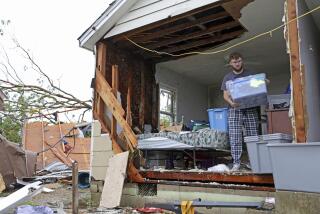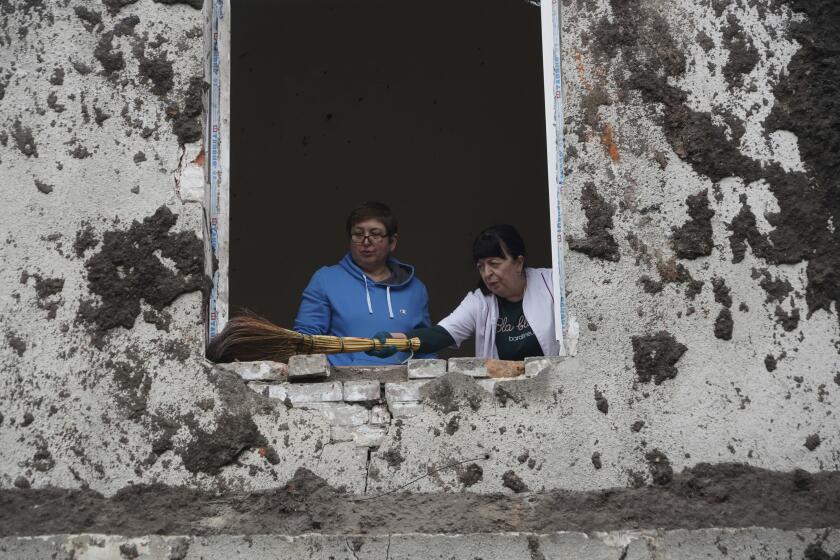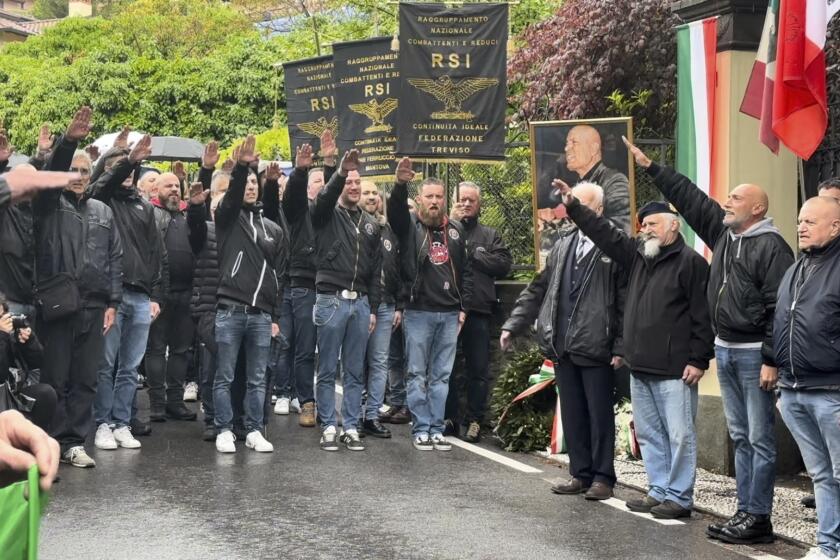Iran May Assist With Reconstruction in Iraq
Despite a quarter-century of tension with Iran, the United States has reached out to the Islamic Republic for help in the postwar reconstruction of Iraq -- and is getting it, according to U.S. and Iranian officials.
Iran will participate in an international donors conference this month in Madrid, and may end up as one of the few aid contributors. It is already offering to provide water, electricity and technical assistance to Iraq, a top Iranian diplomat said Friday. He said his government was prepared to pledge additional aid, although probably not cash.
For the record:
12:00 a.m. Oct. 25, 2003 For The Record
Los Angeles Times Saturday October 25, 2003 Home Edition Main News Part A Page 2 National Desk 1 inches; 53 words Type of Material: Correction
Iran meeting -- An Oct. 4 article in Section A on U.S.-Iranian relations incorrectly reported that Defense Undersecretary Douglas J. Feith attended a Pentagon meeting with the Ayatollah Hossein Khomeini, the grandson of Iran’s late revolutionary leader. In fact, Peter Rodman, the assistant secretary of defense for international security affairs, attended the meeting.
Iran’s possible role in Iraq comes as Washington and Tehran try to resume the behind-the-scenes discussions they aborted in May, senior U.S. officials said.
“We’ve seen some signs and heard from others that the Iranians want to talk,” a senior State Department official said Friday. “We’re sending some signals back.”
Although the countries differ on many issues, the key steps toward resuming talks are working together on Iraq and Iranian cooperation with the U.N. nuclear watchdog agency on inspections, amid U.S. charges that Tehran is secretly developing a weapon off its new energy program.
Armitage Hopeful
After months of allegations about Iran’s nuclear ambitions, the State Department sounded almost conciliatory this week about Tehran.
Iran is supportive of Iraq’s U.S.-appointed Governing Council, and Washington hopes Tehran will “step up to the plate big-time” in pledging reconstruction funds, Deputy Secretary of State Richard L. Armitage told a House Appropriations subcommittee this week.
“On the question of Iran, as much trouble as we have on the nuclear question, we have a slightly different relationship with them on the question of Iraq. They have welcomed the Governing Council,” Armitage told the panel.
“They will participate in the donor conference,” he said. “They have big interests in stability in Iraq.”
Washington, which severed ties with Tehran in 1980, has been deeply concerned about an Iranian role in Iraq amid fears that Tehran might meddle in the political situation there.
A senior Iranian official confirmed that Iran recently accepted an invitation to attend the donors conference, at which Spain will be host but which has been orchestrated largely by the United States. So far, Britain, Canada and Japan are the only other countries to have indicated they will provide aid, even though dozens of countries may attend, U.S. officials say.
Some U.S. officials suggest that an agreement by Tehran to sign a new protocol with the International Atomic Energy Agency could end the standoff -- and facilitate new discussions.
“We also know the Iranians are looking to know that if they sign the protocol and abide by the IAEA that that resolves the question,” the senior State Department official said. “They’d have to sign it, answer all the questions and cooperate fully and ensure they don’t have a nuclear program, then that could resolve the nuclear matter.”
But deep divisions remain within the Bush administration about Iran policy. They were underscored when the same Pentagon officials who urged a war against Iraq met this week for the first time with the grandson of Iran’s revolutionary leader, the late Ayatollah Ruhollah Khomeini, who advocates U.S. support for regime change in Iran.
The Ayatollah Hossein Khomeini, who left Iran this year and now lives in Baghdad, is calling on the administration to help mobilize opposition to the religious government that his grandfather led to power when the U.S.-backed shah was ousted in 1979.
At a meeting at the Pentagon attended by Undersecretary of Defense Douglas J. Feith, Khomeini asked the United States to hold a conference of Iranian opposition figures, U.S. officials said Friday.
Tehran is ruled by a “ruthless dictatorship,” Khomeini said during a speech at the conservative American Enterprise Institute last month.
New Openness
The Pentagon’s interest in Khomeini also contrasted with an Armitage statement that hinted at a new openness in the Iranian government. Armitage told the subcommittee that a top Iranian official had publicly complained that Al Qaeda operatives were plotting from inside Iran to hit targets in other countries -- activities the official said were hurting Iranian interests.
“[Kamal] Kharrazi, the foreign minister, said for the first time, I believe, that Al Qaeda has committed crimes against Iran’s national security by establishing cells to plot operations elsewhere,” Armitage said.
“His comments were the first public admission that members of the network headed by [Osama bin Laden] were more than just fugitives from Afghanistan. So something is going on there,” Armitage added, calling the comments “rather fascinating.”
Iran insists its interest in attending the donors summit and helping reconstruct Iraq is consistent with long-standing policy, reflected in the fact that it dispatched the first delegation to meet with the Governing Council after it was formed. Iran is predominantly Shiite Muslim, as is Iraq. Under Saddam Hussein, Iraq’s Shiites were brutally repressed.
“It would be interesting if you listen only to the propaganda coming out of [L. Paul Bremer III, the U.S. civilian administrator in Baghdad], but if you look at Iranian interests, it will be a continuation of our policy to help stabilize Iraq, welcome the Governing Council and strengthen it as the first step for restoring sovereignty for the Iraqi people,” the senior Iranian official said.
Tehran has been providing water and other humanitarian supplies to Iraq since the U.S.-led coalition invaded the country in March, he said. And U.S. officials say Iran has offered significant amounts of badly needed electricity, although no arrangement has yet been made.
Washington broke off relations with Tehran after the U.S. Embassy there was seized, and various behind-the-scenes efforts to promote diplomatic rapprochement in the intervening years have failed.
After three meetings this spring, discussions between U.S. and Iranian diplomats were cut off after three suicide bombings against American targets in Saudi Arabia.
Washington charged that suspected Al Qaeda agents had a brief telephone conversation with another agent in Iran, an allegation repeatedly denied by Tehran.
The administration also remains deeply concerned by Iranians and others who have crossed the long and porous border from Iran into Iraq. They include Iranian intelligence agents, U.S. officials say.
More Aid Sought
The United States has hoped that all six of the countries bordering Iraq would provide assistance in Iraq.
Washington has been in talks with Turkey about the potential for providing troops, while Turkey and Syria are possible suppliers of electricity. Jordan has promised to help train Iraq’s new police force.
And talks continue with Saudi Arabia and Kuwait, as well as other Persian Gulf states.
It is not known what if anything Iran might want in exchange for its help.
But Iran’s presence at the donors conference, which Secretary of State Colin L. Powell will attend, is particularly striking as the only one of the six without diplomatic relations with Washington.
More to Read
Start your day right
Sign up for Essential California for news, features and recommendations from the L.A. Times and beyond in your inbox six days a week.
You may occasionally receive promotional content from the Los Angeles Times.






